By Casey Rafter
An oil painting of a leafless tree hung behind songwriter Katie Fry last September at Luna’s Cafe. A string of blue orb lights lit the wooden frame of Fry’s harp, which was standing on a modestly-sized stage as she faced the crowd. Fry paused, remembering the first time she ever performed – from that very stage.
Before plucking a string, Fry raised her finger toward a sign overhead. Its message warned, “No covers.”
It’s one thing that patrons and performers will miss when Luna’s closes for the last time this Saturday. Owner Art Luna told Sac News & Review that the new proprietor, William Houser, shares his enthusiasm for nurturing the local artistic community.
The now-famous sign was an effort not only for Luna — who opened the cafe with his sister. Chris, in 1983 — to avoid having to bargain and haggle with ASCAP and BMI over royalty fees, but also a reflection of his deeper philosophy. Luna felt that if musicians were brave enough to take the stage at his cafe, then he’d rather they shared their own creations instead of someone else’s.
“Really, from the beginning, we never played covers,” Luna said. “I want to hear what people have to say in their art whether it’s poetry, music, dance, comedy. I want to hear what they’ve got inside them, not their interpretation of somebody else’s work.”
A haven and home stage for generations of Sacramento musicians, poets, artists and performers, Luna’s is a place where anyone who’s taken the stage knows all about that credo: Avoid the practice of covers completely, or at least be sly about it.
“Sometimes people will slip in something that’s their homage to an artist that inspired them, but I tell them ‘Don’t fucking tell everybody, ‘I’m gonna play a cover,’ just play the goddamn thing,’” Luna chuckled. “They want to charge hundreds of dollars a year for the songs that musicians are playing. I tell them, ‘They play here one time, they’re gonna make more that night than you’ll ever pay them in their lifetime. I’m gonna pay them, not you.’”
Nate “Naked Nathan” Beier admitted that, in all the time he’d spent on the stage at Luna’s in two decades, there were moments he occasionally ignored the “no covers” sign.
“Actually, I probably played more covers there than I realized,” Beier recalled. “It became a performance mainstay … it seemed like from 2001 on, I had shows there on a fairly regular basis. There must have been a book he’d call from if he had a spot open or somebody canceled.”
Beier’s most recent action at Luna’s was drumming for poets.
“I think it went until almost midnight just because so many people showed up,” Beier noted of the evening. “Poets asked me to drum for them, so that became extra special. I got to actually perform my main instrument one more time there.”
Chicano art and pina colada dreams
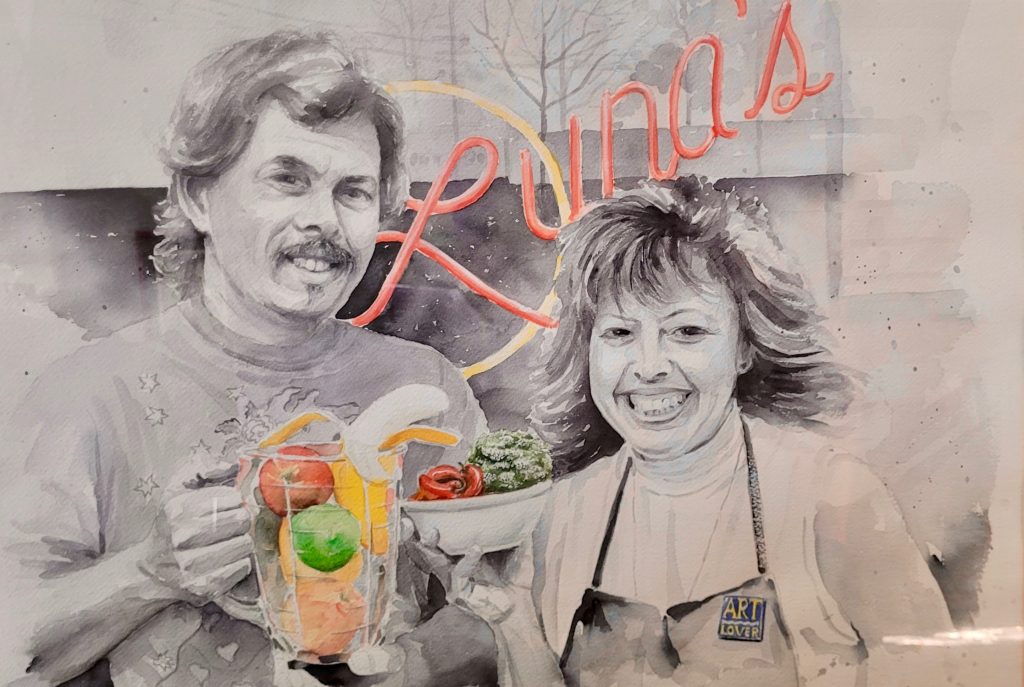
Shortly after announcing Luna’s closure, SN&R sat down with Luna in his empty cafe, hours before he opened. The walls resemble a gallery while the tiny stage takes up a curious amount of room in the space. It’s a venue that can fit a surprising number of patrons when things are popping.
Serving fresh, never from concentrate juice has been Luna’s bag since before there even was a Luna’s Cafe. His first business, Juicy Lucy’s, was adjacent to the bus station at 8th street and K in Downtown. Luna modeled its menu after a traditional Mexican juice bar, beginning a decades-long tradition of offering juice from ingredients that were never frozen or processed.
“People from the bus would run over and get a juice,” Luna remembered. “It was a gold mine. Lines around the block, but my partner at the time didn’t want to work the business.”
Enter Art Luna’s sister, Chris, creating a winning combination that saw that business thriving. After owning a Mexican restaurant in the Bay, the Lunas were making their return to Sacramento. But first, Luna was struck by a dream in the night, one that showed him a Puerto Vallarta beach with a couple of pina coladas.
The weeks following led Luna to the sandy shore in his vision. It was a journey that included crossing paths with Queen Elizabeth II’s 1983 tour of Mexico and a stop at Mazatlan for Carnaval. As the Queen’s party departed, Luna found himself in a nearly-vacant town.
“We got a chance to see her and the next day, she pulled out,” Luna said. “All the newspaper people pulled out; we had the rest of the town to ourselves for the next month or so, we literally sat on the beach with a couple of pina coladas. It was really cool.”
Later that year, Luna was back in Sacramento, the town he’d called home since he was 13. Luna’s Cafe opened in Sacramento on Aug. 5, 1983 and quickly became a welcoming space for art and artists.
Luna was already used to booking performers. He’d previously scheduled the live events at his grandmother’s restaurant, including an all-jazz night on Wednesdays and regularly booking flamenco act, La Fiesteros, on Saturdays. Once he had his own café, La Fiesteros was looking for a Sacramento stage to perform on.
“Nobody was doing flamenco in Sacramento, so within two or three months of opening Lunas, we started doing flamenco,” Luna explained. “Eventually, I had this stage built. Dennis Wilkerson had the theater space (now the California Stage) and built it for me. He was coming in for the flamenco and was a wonderful customer.”
In an effort to strengthen his connection with the Latino community, Luna offered up his café as a space to hold group meetings. It was soon hosting La Raza Galeria Posada and The Royal Chicano Air Force.
La Raza ended up being the first artists collective to install pieces at Luna’s Café.
“That was always important for us in the beginning: to show Mexican and Chicano artists,” Luna reflected. “They weren’t being shown in the local galleries. People figured their work was more folk art not fine art, which was bullshit.”
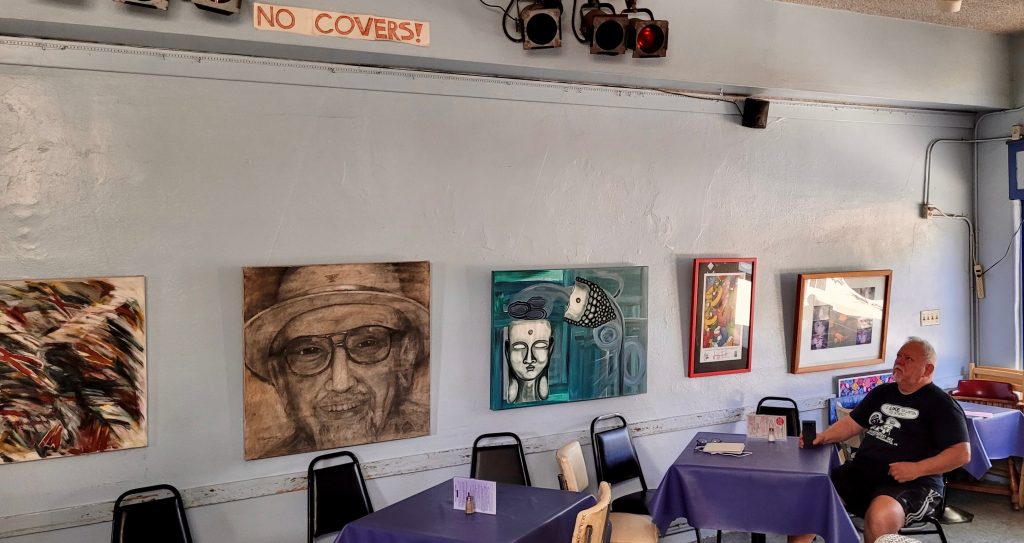
The Royal Chicano Air Force had already been creative activists in Sacramento for 13 years by the time the café was established. Luna himself admired the work of Jose Montoya, Esteban Villa and Stan Padilla — all creators involved in the group. RCA began showing art Luna’s in 1985.
Padilla warmly recalled Luna’s as a haven for community-driven artists, while its owner was a champion for those in the struggle. Padilla spoke to SN&R from his 13-acre Placer County artistic retreat. It’s a place where he says he lives a natural lifestyle — one that matches well with Luna’s.
“This concept of a juice bar — natural living, natural foods — that was still kind of marginal,” Padilla observed of Art Luna’s earlier business ventures. “At that time, Sacramento was in a different frame of mind. It wasn’t as open or multicultural as it is today…I come from the kind of Bohemian beatnik coffeehouse tradition…Luna’s had that vibe to it.”
Padilla added that nearly all of the RCAF murals were conceptualized during meetings at Luna’s. To him, the cafe is a crossroads where artists from different origins and generations with varying perspectives could cross-pollinate ideas without the influence of museums or galleries.
“I trusted Art from the very beginning,” Padilla stressed. “There wasn’t that competition and rivalry that I see a lot today among the younger folks. They’re all striving to be something. To go beyond this and beyond their boundaries. I came out of choice and this is where I wanted to place myself.”
‘All Things Must Pass’
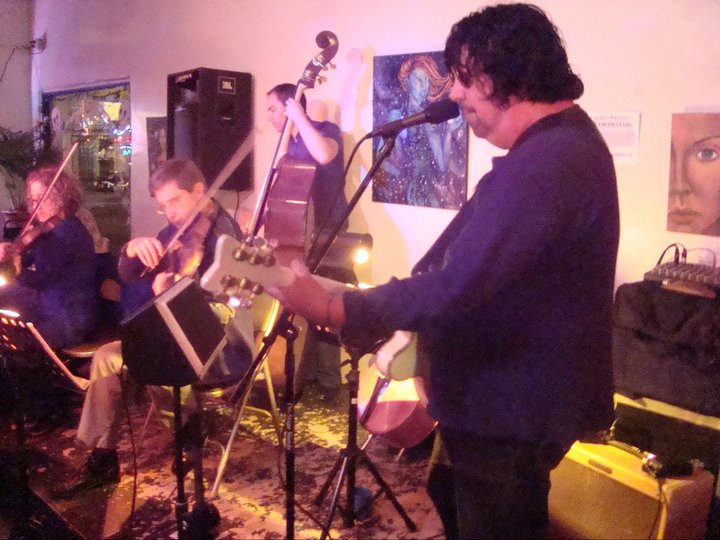
In 2003, after a failed buyout from an outside party, Art Luna gained sole ownership of the cafe. Luna and his sister had designed the business to be totally self-reliant, so that all involved could “live by the business without the burden of a second job.” He proudly boasted that, outside of the assistance he applied for during the COVID-19 lockdowns, he never pursued government funding to keep Luna’s afloat.
“I always joke that we are nonprofit, just not getting the grants,” Luna said. “Whoever was working with us — and we had three or four employees — they were able to work on what they made here.”
Jennifer McKernon worked at Luna’s as an open mic host every Wednesday night in 1998 and 99. She’d first happened upon the gig by chance. Luna was not sure he’d be able to pay McKernon, especially not knowing if an audience would show up. People did. McKernon, who would read poetry and recite her dreams at the mic under the name Max Denver, said that Luna admitted it was the first time the cafe had turned a profit on Wednesday nights.
“It was packed, but he gave me something to eat and paid me in beer after work,” McKernon recalled. “It changed my life, being in public, doing spoken word and being on stage and running the show…. We had regulars: David Houson…Mr. V, we’d call him, but Esteban Villa from the Royal Chicano Air Force would be there. I later learned about him in art history and I thought he’d been teasing me about how famous he was.”
McKernon also noted that, as an open mic host, she dreamt of making artwork. Some years later, in her 40s, after the death of her son, she began to study and create. This pursuit led to her own showing at Luna’s Cafe in 2022.
“Which was amazing because he has a lot of native, Chicano art and … I’m a white girl from the suburbs,” McKernon observed. “It’s different than other art shows I’ve done, because it carries this emotional existence. Every individual that goes in there feels like they have this special relationship with the owner, and everybody does have their own special something.”
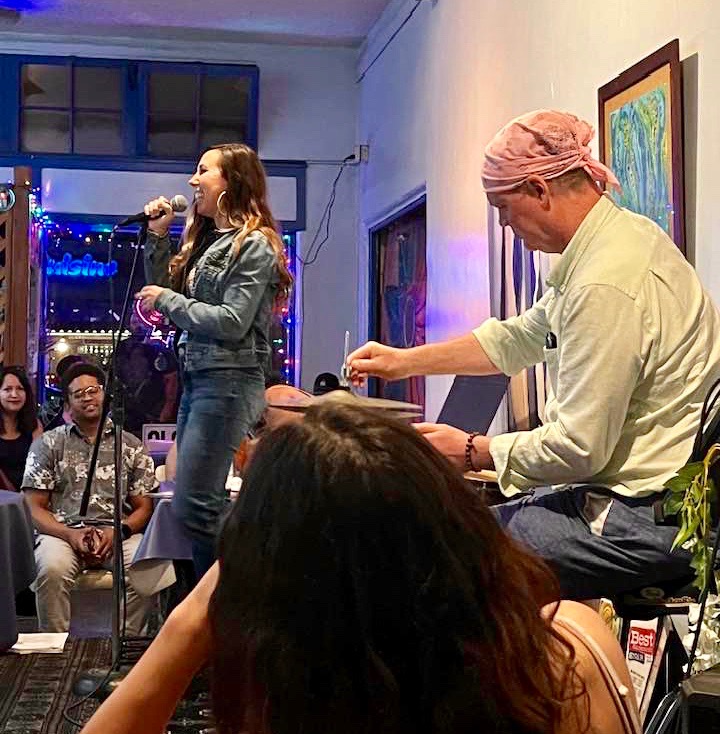
Luna said that David Houston was a returning face he’d often look forward to seeing. The musician booked shows with fellow player Kevin Seconds at Lunas so frequently that, after struggling to fit them in around his calendar in the early 00s, Luna offered Houston a regular gig on the last Saturday of each month.
Houston acknowledged it’s been hard sorting through decades of memories around Luna’s, to the point where he finds himself in denial about the upcoming change. Houston has always felt at home at the cafe because his music calls for a fluid give-and-take of attention and energy between him and the audience. Luna’s, to him, was the perfect fit for that exchange.
“So much so that, if a couple walked in and started drinking and talking, other people would get up from their tables and ask them to be quiet,” Houston remembered. “This Man really cares about this place and the Sacramento art scene, including music and art and poetry…Art’s Art. It’s not so much the place, it’s him. He creates the ambiance and the vibe for the place.”
After trying to work with computers in the 90s DOS-era and then being bitten by a power outage before he could save his work, Luna started relying strictly on the use of a paper calendar to book the gigs done at his establishment.
“That was my bible and if it wasn’t there, you didn’t have a show,” Luna detailed. “I did not trust the internet because sometimes it would go down, or in my experience with that first mailing list, I lost it.”
Sacramento musicians aplenty performed their first gig at Luna’s. The name of those who’ve been on its stage span decades of incredible local talent like Katie Fry, Autumn Sky Hall, Cake —who’s lead singer John McRea lived above Luna’s for a time — Sarah Reiwitch, Ninefingers, David Houston, Naked Nathan, Kevin Seconds, Harley White Jr., Be Brave Bold Robot and Hobo Johnson.
A hub of excitement for anyone interested in art – that was Luna’s goal.
Though Luna nearly gave up on hosting poetry in the 90s altogether when local poets proved to be too violent, lewd and misogynistic for his liking, poet Joe Montoya saved the owner’s enthusiasm for it by presenting his “Poetry Unplugged” series. That offering has been active at Luna’s Café for nearly 30 years.
Slam poet Marvin Xia said Luna’s provided audiences with an easily accessible atmosphere where artists could convey a more niche message. He first began attending Poetry Unplugged summer 2016.
“I was kind of getting into the whole world of writing and creativity and I wasn’t sure where to begin,” Xia said. “I found Luna’s online randomly as a hub for all sorts of artistic endeavors.”
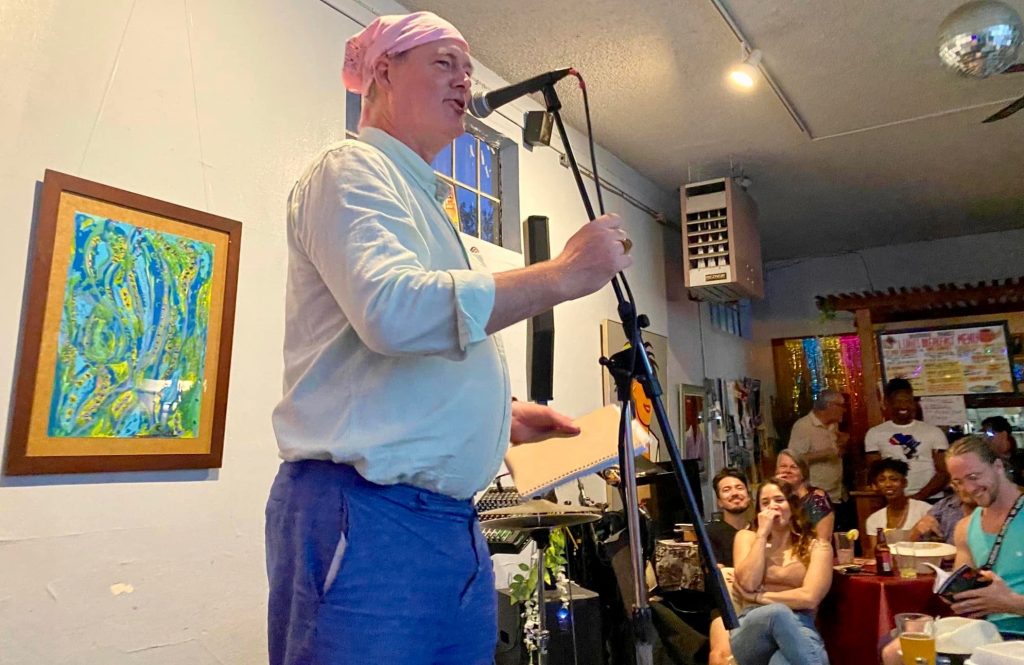
Xia visited Luna’s to read his poetry sporadically over the next few years. One collaboration he took part in at the venue was as a part of Sac Unified Slam Team, a group that included local poets Sho Nuff, AndYes, J-Rowe, Ike Torres and Jenny Davison. Xia said that one of the motivators that pushed him to present was to counter the notable absence of Asian Americans in art.
“Even now, I don’t think there’s that many Asian American voices in slam poetry,” Xia mentioned, adding that the audience seemed to lean in to what he had to say. “They really latched on to that and I think it surprised a lot of people that this is coming from a specific ethnicity that always tends to be a little bit more-quiet. Coming from a family that isn’t big on … putting yourself out there publicly, given specific cultural circumstances, this was a very big thing for me, and I would say Luna’s was instrumental in that.”
Luna took a moment to think back on times when he might have had regrets, or second thoughts, about maintaining the business. He came up short. He’s confident that his last 40 years was right in line with how things should have been.
“There’s never been any doubt,” Luna confessed. “I love this business. The only reason I’m selling is the guy’s made me an offer I can’t refuse…Working with young people, they come back later and tell me ‘You changed my life. You gave me confidence.’ I sometimes don’t realize that when it’s happening.”

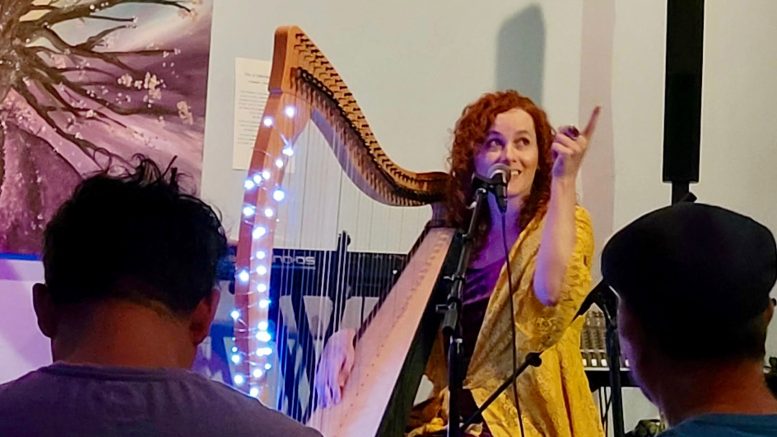
Great article/interview. The community is losing an iconic location, there will never be another thing like it.. viva la lunas !
Nice article, Mr Rafter, sounds like a very interesting place to hang out
A wonderful story of artistic and personal principles. I wish I had gone down there to listen and perform.
As a person who has been there, I can attest that it’s all true: Art has made an important place.
Thank you for this incredible interview. Luna’s will be sorely missed.
Luna’s made Sacramento a livable place when I worked at the Sacramento Bee in the 1980s. A friend named Lucero took me there to eat…there were very few cool things in town back in those days.